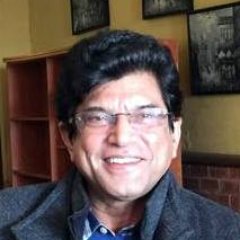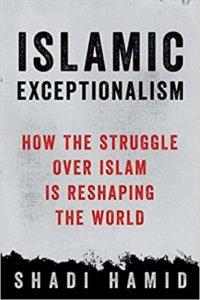Rohit will (once technical issues are sorted out) be joining our stable of writers. Until that happens, he asked me to post this from his own blog:
(again, to be clear, this is not my writing, it is written by Rohit Pradhan)
The facts are starkly clear. The Bangalore branch of a storied bakery chain based in Hyderabad was targeted by certain individuals who forced it to cover Karachi. And replace it with the Indian flag. Never mind that the extant organization was founded by a post-partition Sindhi immigrant in the memory of the land he had been forced to flee in the orgy of the violence which followed India’s partition. The parent chain issued an abject clarification on multiple social media channels reiterating its Indian roots. It wasn’t a homage to Karachi which happens to fall in the Pakistan of 2019 but the city which was home for generations of the ancestors of its founder. The utter absurdity of this entire episode is beyond belief.
Perhaps, one is reading too much into a single incident. Perhaps, in a country of 1.3 billion people, it is easy enough to assemble a mob of few who are offended by everything. Or anything. Or perhaps it is not as singular as it may superficially appear and there are some larger lessons to learn here. Three points follow.
First, Karachi bakery has been forced to issue that absolutely shameful apologia because no one expects the Indian state to protect it from the anger of righteous mobs. The mobs which can cite whatever perverse version of nationalism they are extolling currently. And while the blame for it majorly goes to the ruling dispensation, the fact that its establishment was targeted in a state ruled by the opposition simply can’t be ignored. One formation may encourage this perversity; the other side has mostly abdicated its responsibilities so fearful it is now of rocking the prevailing doctrine. Politics is not a purist sport but if you can’t draw even the most basic distinctions, then it may not be one participating in as well. This is no attempt at false equivalence but underlining the fact that a reassurance from the leaders of Karnataka would have gone a long way in assuaging the frayed nerves of a bewildered organization caught in the middle of India’s cultural wars.
Second, the kind of nihilistic nationalism which thought it fit to assault a blameless commercial organization has sadly received a major assist from the social media. Where hunting down alleged anti-nationals has become a major sport and a pathway to gain popularity, cheap retweets, and potentially significant monetary rewards. The more strident the tone; the more heartfelt the criticism is the absurd logic where even a national icon like Sachin Tendulkar can no longer be insulated by his humongous achievements and services to India.
Liberals can’t escape the blame entirely here: their previous prescriptions of people-to-people contact or decrying war as a priori have failed abjectly to deliver any sensible results. They have long dominated the conversation utilizing similarly convenient rhetorical tools dismissing every criticism as warmongering.
As the narrative has dramatically shifted, they have no epistemological counter to this closing of the Indian mind. In this new world, they have failed to craft a new language which can counter this toxic and self-defeating nationalism. The neo-Right has intuitively understood and adroitly exploited the frustration of ordinary Indians. The liberals have withdrawn from this tough fight favoring the easy environs of their echo chambers facilitating the further normative dominance of this singular version of nationalism. Unless they are prepared to embrace patriotism located in the Indian genius and not their ersatz explication, their further disfranchisement is assured.
Third, writing in the Indian Express, Pratap Bhanu Mehta, has recently argued that India has lost to Pakistan. If further evidence was required of that interrogation of India’s deep psychological wounds: Karachi bakery provides the perfect instance. The anger, the frustration, the fecklessness, the sense of being utterly helpless have found the fullest expression. A country which in its own estimation deserves a place among the comity of the most powerful nations in the world has been utterly shown up. And it has nowhere to hide: unable to counter repeated terror attacks from an apparent also-ran which it had long left behind in its wake.
It maybe couched in the braggadocio of sneering twitter insults and memes recalling 1971, but no one should confuse it for what it really is: utter and complete surrender. Unable to punish the external perpetrators, its sullen frustration has turned inwards: manufacturing villains where none exist. The social media nationalists would indubitably disagree but this is weakness masquerading as strength and vicious backlash corralling the weak. A schoolyard bully lashing out at the vulnerable because even as its parades its strength, it is utterly aware of its decrepitude. A wounded civilization too proud to recognize its own ruins.
It makes one go back and read V S Naipaul’s An area of darkness A stronger criticism of the Indian civilization is yet to be written and its searing postmortem of its psychological wounds has never been surpassed. Unfortunately, because Naipaul was so unsympathetic a figure both as a writer and in his writings, both Indian liberals and nationalists have often misunderstand him as a brown sahib, and not what he really was: a man who wanted to embrace the land of his ancestors, and whose love story went awry.
There is anger, and then there is anger. There is the fury of Naipaul which uses a surgeons’ scalpel to bludgeon a country which had left him frustrated and confused. But it still stems from a deep reservoir of affection almost willing it to do better. And there is anger which is self-destructive; which appeals to the most baser instincts; and which simply can’t countenance the wisdom of a better India.
India must choose wisely. And must select which version serves it better: the defeatism of the inward looking malignancy which has long given up on India, and must therefore pander or the the one which pricks and raves and rants because giving up is simply not an option. And a better future might still arise from the debris of an eviscerated India. And from recognition of its weaknesses.
Naipaul’s next two Indian travelogues were more hopeful of its future. Perhaps therein lies redemption.

